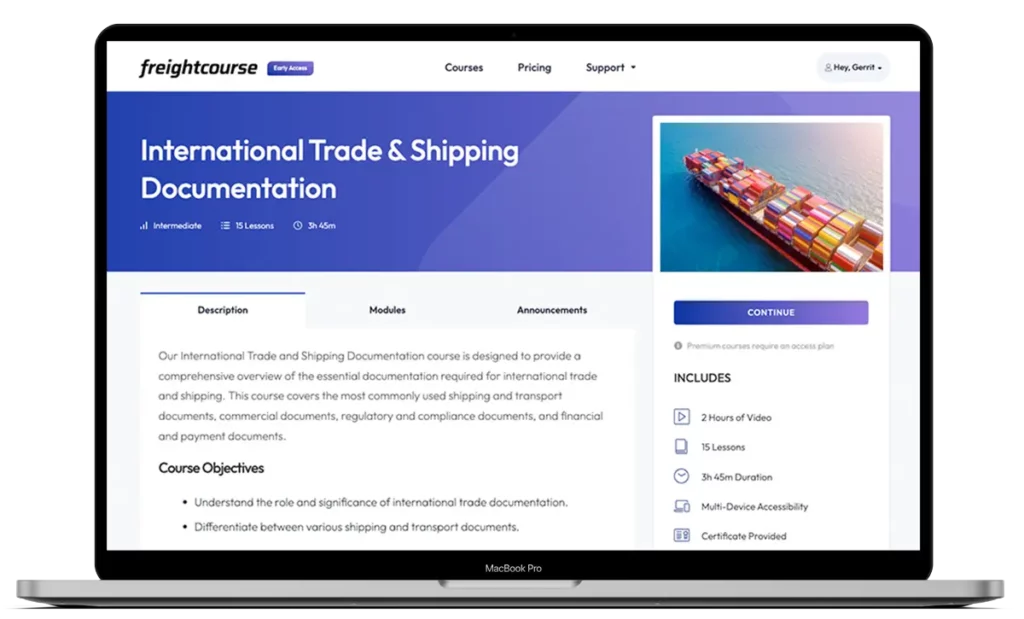Efficient freight movement is the heartbeat of every country. Timely transportation of goods is essential to a region’s economic well-being, infrastructure, and operations. Trucking is one of the most critical modes of freight movement as it is the largest sector, accounting for more than 700 billion U.S. dollars, annually.
While trucking companies run on thin margins and have to overcome various factors to remain profitable, they hire a vast team of professionals that ranges from truck drivers and customer service officers to dispatchers.
A truck dispatcher is a professional who manages and handles some of the most challenging tasks that include finding profitable routes for its drivers and utilizing resources efficiently so that the trucking company is able to operate profitably.
This article will cover the responsibilities of truck dispatchers and other important aspects of the job. You will also learn about other interesting facets such as truck dispatcher salaries, skills requirements, career paths, and training.
Here’s a quick summary of the content we’ll cover
- Definition
- Scope & Tasks
- Job Description
- Skill Requirements
- Salary Guide
- Career Paths
- Training Programs
- License Requirements
- Important Tips
What Is a Truck Dispatcher?
A truck dispatcher is a salaried employee that works for a trucking company or a business entity representing the carrier and is responsible for efficiently assigning and scheduling truck loads.
Depending on the scope of their responsibility, a truck dispatcher may have to search for truck loads for the company and negotiate on their behalf with a freight broker or shipper.
They may also be tasked to leverage personal connections, use load boards, or use digital freight matching platforms to find loads for the company. This also means that they would need to establish a communication channel with brokers and shippers to negotiate prices and dispatch drivers once an agreement has been made.
Unlike a freight broker, a truck dispatcher is only directly affiliated with the carrier and continually works in their interest. Even independent freight dispatchers are tied to the carrier they are working with as they find loads and conduct negotiations on their behalf.
What Does a Truck Dispatcher Do?
Truck dispatchers play a crucial role in the supply chain, as they are primarily responsible for coordinating truck loads, schedules, and routes between shippers, manufacturers, and brokers.

The day-to-day responsibility of a truck dispatcher varies from company to company. However, there are some common responsibilities they’re tasked with that include keeping records, overlooking drivers’ daily logs for mistakes or rule violations, managing equipment availability, and overseeing drivers’ working hours.
Moreover, they stay in touch with truck drivers throughout their journeys to flag potential problems and troubleshoot any issues that may arise on their route. Truck dispatchers must also be tech-savvy as they need to track locations, find loads, and communicate with drivers and shippers using various computer programs.
They ensure the trucking company handles loads efficiently and minimize truck driver expenses to remain as cost-effective as possible with intelligent and strategic planning. More details and insights about a truck dispatcher’s role will be covered in the job description section below.
Truck Dispatcher Job Description
In this section of the article, we will closely examine the responsibilities and job description of a truck dispatcher.
1. Driver Scheduling
A critical part of a truck dispatcher’s job is to keep track of drivers’ availability and choose the most suitable driver for the job. They must also consider the drivers’ experience on the road and the maximum number of hours they can operate their trucks, according to the Hours of Service Regulations.
A truck dispatcher must also ensure the driver’s safety and compliance with the guidelines and regulations set by the Department of Transportation and the Federal Motor Carrier Safety Administration.
2. Freight Scheduling
Efficient freight transportation requires advanced planning. Truck dispatchers must also keep track of the pick-up and delivery of cargo, and prioritize urgent orders accordingly.
3. Route Planning
Truck dispatchers are responsible for making operations cost-effective and time-efficient, so they need to plan routes for every trip smartly. They regularly check for roadblocks, weather conditions, and potential delays beforehand to ensure the freight is delivered, the drivers are safe, and the trips are profitable for the business.
4. Load Planning
Truck dispatchers must utilize the equipment of the trucking company intelligently and strategize how to profit from maximizing space in a single trip. They need to optimize the efficiency of the trips by consolidating loads based on their routes or by ensuring rewarding backhaul loads.
5. Truck Loading
Although most truck dispatchers are typically not involved in physically loading-trucks, some carriers may require them to oversee the truck-loading process. If the freight is fragile or has special handling requirements, the shipper may ask the trucking company to overlook the freight loading.
6. Customer Communication
Truck dispatchers must have exemplary client communication skills in order to secure loads and maintain good relationships with shippers and brokers. They are tasked to schedule appointments, coordinate with customers, and communicating transportation details.
They may also be required to check and oversee special handling requests (for fragile or dangerous cargo, for example).
7. Stakeholder Management
Aside from communicating with the shippers and brokers, truck dispatchers must liaise with internal stakeholders to be effective. For example, they must closely liaise with the company’s sales team to plan deliveries, communicate and ensure that the information is up to date within the company.
They also need to share the progress in their department with the upper management to help them build a clear outlook of where the company stands.
8. Customer Service
In certain situations, truck dispatchers may need to attend to inquiries and provide customers with relevant shipping information. This involves negotiating rates with potential customers to keep the trips made by the truck drivers profitable and handling complaints made by previous customers.
Trucking companies often rely on them to resolve complaints, improve processes, and ensure customer satisfaction.
9. Special Handling
If a truckload has specific handling requests, the dispatcher must secure escorts, flagmen, or permits as necessary. This ensures the carrier adheres to the regulations put in place in accordance with local regulations.
10. Driver Monitoring
A truck dispatcher must stay in touch with the drivers on the road throughout their trip to ensure no issues occur on the road. They monitor the GPS trackers, driver logs, as well as dispatch and arrival times.
They are also required to be ready to attend emergency and non-emergency calls and record them for future reference (according to company policies).
11. Documentation & Record Keeping
All communication between the truck dispatcher, customers, and drivers must be appropriately recorded for future reference. They are responsible for preparing and dispatching documents, preparing and issuing freight invoices, recording calls, and managing documentation of deliveries and orders.
These records can prove to be highly beneficial if an accident occurs or a problem arises due to miscommunication.
12. Compliance Obligation Tracking
Truck dispatchers are also responsible for ensuring that the truck drivers’ licenses are up to date. They keep an updated database of driver and truck information to monitor license statuses and permit expiry and renewals.
13. Truck Maintenance
Dispatchers in trucking companies are also tasked with monitoring and scheduling regular truck maintenance to ensure the longevity and productivity of the equipment.
They must ensure each truck is maintained appropriately in order to maximize truck utilization and ensure that they pass all safety standards.
14. On-Road Solutions
Truck dispatchers must be adaptable and possess good conflict-resolution skills. They must be able to swiftly provide solutions for any breakdown issues or offer guidance for truck drivers’ concerns during their journey to ensure that the cargo is delivered on time.
Truck Dispatcher Skills
A truck dispatcher must have several skills that will allow them to manage all tasks assigned to them. We have outlined the most critical skills requirements below in detail.
- Computer Literacy – A truck dispatcher is responsible for finding new loads, routing trips, planning schedules, preparing reports, and studying trends. These tasks require them to have good computer skills, such as monitoring GPS trackers correctly, using transport management systems, and planning schedules, among other tasks.
- Communication – Truck dispatchers are the face of the carrier as they negotiate deals with shippers and brokers, and must relay information confidently and concisely. Similarly, proficient dispatchers provide clear instructions to truck drivers to ensure they adhere to client requirements.
- Language – A new truck dispatcher may find this challenging but experienced ones use the correct industry terms and have a command of the language used by clients and drivers. Their language skills must be top-notch since these will dictate the effectiveness of their communication.
- Planning – Smart planning and understanding of how to use scheduling tools reliably help truck dispatchers stand out. These tools can be used to schedule trips, book regular truck maintenance, check drivers’ availability, and maximize efficiency by planning the best routes and backhaul loads.
- Organizing – It is the responsibility of the truck dispatcher to record and upkeep documentation for trips. This allows them to effectively keep records of all documents, such as insurance, invoices, transportation documentation, and others. They must know where they can find emergency response details and procedures in case problems arise.
- Time Management – It is essential for a dispatcher who arranges trips, optimizes routing for time efficiency, and organizes drivers’ schedules to be excellent at time management. Fundamentally, people who manage their time well can become outstanding truck dispatchers and bring in more revenue for their company.
- Risk Management – Managing truck loads comes with many risks that a good truck dispatcher should be equipped to handle on the fly. They must recognize risks like layovers, delays, roadblocks, accidents, bad weather conditions, and breakdowns. Having a resolution plan ahead of time for possible issues and organizing schedules accordingly is part of managing these risks.
- Emotional Intelligence – Highly qualified truck dispatchers must have good emotional intelligence as their job requires them to remain calm and in control of high-stress situations. They must be focused on performance and should be able to assess conditions critically and logically. It is also crucial for them to listen to customer complaints and resolve them calmly.
- Critical Thinking – Whether a carrier is facing problems due to cargo damage, truck breakdown, or re-routing, first-class truck dispatchers would be able to utilize their critical thinking skills and prioritize customers’ interests as best as possible. Critical thinking also includes considering trends and analyzing data to find optimal routing solutions.
- Flexibility – Every successful truck dispatcher needs to have some form of flexibility when liaising with their customers and taking on various types of additional tasks. They would know which drivers would be the best fit for a job and should be able to change their approach according to the situation.
Truck Dispatcher Salary
The average salary for a truck dispatcher is typically around $42,000 to $62,000 per year. There are various factors that determine their actual salary such as the location of their employment, the years of experience they have in the industry, their certificates and education, and the kind of skills they can offer to their carrier.
There are also several other aspects that can determine a truck dispatcher’s pay, such as the hiring company’s remuneration policy, how much profit they bring to the business, and how large the company is.
It’s important to note that some states offer a lower or higher salary to truck dispatchers than the national average salary, as local demand and cost of living differ from state to state.
While most truck dispatcher salaries fall within fall within the average range (with a 15% variance) of the average amount, the highest salaries a senior and experienced truck dispatcher can earn amounts to about $70,000.
How To Become a Truck Dispatcher?
If you are interested in pursuing a job as a truck dispatcher, there are two paths you can take to start your career in the industry. You can apply to carriers and trucking companies or become an independent truck dispatcher.
In the section below, we will guide you through the steps and requirements to start your career.

Becoming an Employed Truck Dispatcher
Being hired as a truck dispatcher is relatively straightforward compared to becoming an independent truck dispatcher. This process is similar to being hired as an employee of any company.
- Firstly, you must have at least passed a General Educational Development (GED) test to be considered for the position. If you have a diploma or have pursued higher studies in a related field, you might be favored by the hiring department due to your educational background.
- The next step is to research job opportunities and relevant companies you are interested in working with. We highly recommend you apply to work with trucking companies or large-scale manufacturers and distributors who manage their own fleet of trucks.
- To apply for a job at trucking companies, distributors, or manufacturers, you need to build a CV or update it according to the skills and education required for the position.
- Send your CV directly to the hiring department of the companies you want to work with or apply online (through job portals) for open positions.
- Once you receive a call from the companies you applied to, you should prepare accordingly, study the company well, and attend interviews to get a job at their organization.
Becoming an Independent Truck Dispatcher
Being an independent truck dispatcher is more challenging and time-consuming than working as a truck dispatcher at a trucking company. It entails setting up a business and acquiring clients on your own. The steps for becoming an independent truck dispatcher are listed below:
- To become an independent truck dispatcher, it is highly recommended to attain a relevant diploma or pursue higher studies in a supply chain-related field. Additional experience in the industry as a truck dispatcher can also prove to be beneficial. Having at least 3 years of experience can be significantly helpful; however, it isn’t strictly required for starting a truck dispatcher business.
- Independent truck dispatchers must focus on educating themselves about the industry and learning what makes them successful in the field. As an aspiring independent truck dispatcher, it is crucial that you study different equipment types, best practices, and different kinds of loads. As mentioned in the upcoming section, you may train yourself professionally and acquire certifications (such as NDFCA’s National Freight Dispatcher Certification) to boost your knowledge and credibility.
- The next step is to conduct market research to plan for your business operations. Market research will help you establish a foundation to operate your business, while a financial study will help you manage your finances and books. Once you have set business and financial goals, we advise you to work out other minor details and finalize your business plan.
- Once you have finished working on your business plan, the next step is to register your business. Choose a suitable name that is easy to remember for your clients.
- After choosing the business name, decide on the business structure you want to adopt (Sole Proprietorship, Partnership, Corporation, S Corporation, or Limited Liability Company (LLC)). This depends on whether you are working independently, with a partner, or with a group of partners. After choosing the right type of business structure, you can proceed with registration.
- After registering your business, you must apply for an Employer Identification Number (EIN) with the IRS. This number, also known as the Federal Tax Identification Number, is used to recognize a business entity.
- The next step is to prepare your business documents, including carrier contract templates (for various arrangements between your business and other trucking companies), service agreements, and pricing structure.
- When you have prepared all business documents, it’s time to reach out to interested carriers and companies you want to work with. Develop an impressive pitch for your services and begin building dispatcher and carrier relationships for your business.
- Once you have secured contracts from a few carriers, you’ll need to work on developing your business and improving business relationships with shippers and freight brokers. Set up a website where people can reach you, register your company on load boards, leverage your networks for loads and referrals, and begin making freight transportation more efficient for your clients.
Truck Dispatcher Training
If you have been hired as a truck dispatcher, there is a high chance that your company will provide the required training to you. Some companies invest in their employees and send them for external training.
If you are an independent truck dispatcher, you would need to sign up for external training yourself, which can help you advance your skills and career.
The most common topics covered in these training courses include learning about various freight and logistics terminology, studying different types of equipment and their use, regulations that truck dispatchers must follow, log book rules, and all about factoring and its workings.
Some of these courses also teach independent truck dispatchers about marketing, tax management, building agreements, preparing documentation, and more.
Here are some of our most recommended courses and certifications to become a successful truck dispatcher.
| Training Company | Course Name | Website |
|---|---|---|
| NDFCA | National Freight Dispatcher Certification | Link |
| LearnDispatch | Truck Dispatcher Training Course | Link |
| Udemy | Truck Dispatch Training | Link |
| Truck Dispatcher Training | Truck Dispatcher Training Course | Link |
| Alison | Freight Dispatcher | Link |
Truck Dispatcher License Requirements
To become a truck dispatcher, you do not need to acquire a license. If you plan on starting your own business as an independent truck dispatcher, you only need to have a GED (at minimum), build a business plan, choose a name and business structure, and register your company.
You also need an EIN number to help identify your business. After that, you can begin preparing contracts and agreement templates for your business and reaching out to potential clients.
7 Important Truck Dispatcher Tips
Becoming a successful truck dispatcher is not an easy feat. You must find truckloads, navigate new technology and platforms, build relationships, and do much more. Here are 7 tips for truck dispatchers to increase their productivity and proficiency:
1. Find The Best Load Boards
There is a wide variety of free and paid load boards online. Therefore, truck dispatchers need to find the best load boards that are the right fit for their operations. A good load board is easy to use, has excellent features, and offers many load postings.
2. Explore New Technology
Truck dispatchers must always be flexible and adaptable, especially when it comes to new technology. Leveraging technology can help them score more loads than others in the market, improve productivity, and streamline processes.
Advanced Transport Management Systems (TMS) and digital freight matching platforms make scheduling and monitoring much easier. Therefore, you should always be on the lookout for new and improved software.
3. Take Breaks
Truck dispatchers must always be on their toes, attending calls from truck drivers, and making a good impression at client appointments. Nevertheless, you need to take regular breaks as you work to manage your mental and physical health, even amid stressful situations.
4. Be Transparent
Always take ownership of mistakes and practice honest and open communication with customers and your internal stakeholders. Your customers and colleagues are much likely to trust you more if you provide them with clarity regarding problems or delays.
5. Upgrade Yourself
Truck dispatchers should continually work on improving themselves and updating their skill sets. Knowledge is key to advancing in the industry and becoming a successful truck dispatcher. Upgrade yourself with new certifications and training, and invest in industry-related courses that will benefit your career.
6. Build Relationships
Due to the many job responsibilities that come with being a truck dispatcher, it is easy to get sidetracked and forget that you are working alongside people just like you.
Aside from performing your job well, you should also focus on building individual relationships with truck drivers, partners, clients, and other professionals. These people may share valuable insight about new industry market trends and offer great advice on running effective internal operations.
7. Take One Step at A Time
When you are just starting out as a truck dispatcher, the mountain of tasks you have to complete can be daunting and overwhelming. Therefore, it is best to break down tasks by priority and create checklists to keep yourself on track.

Get Free Course Access
If you enjoyed the article, don’t miss out on our free supply chain courses that help you stay ahead in your industry.

Andrew Lin
Co-Founder & Writer
at freightcourse
About the Author
Andrew is a multi-business owner with over 12 years of experience in the fields of logistics, trucking, manufacturing, operations, training, and education.
Being the co-founder of freightcourse has given him the ability to pursue his desire to educate others on manufacturing and supply chain topics.
Follow us